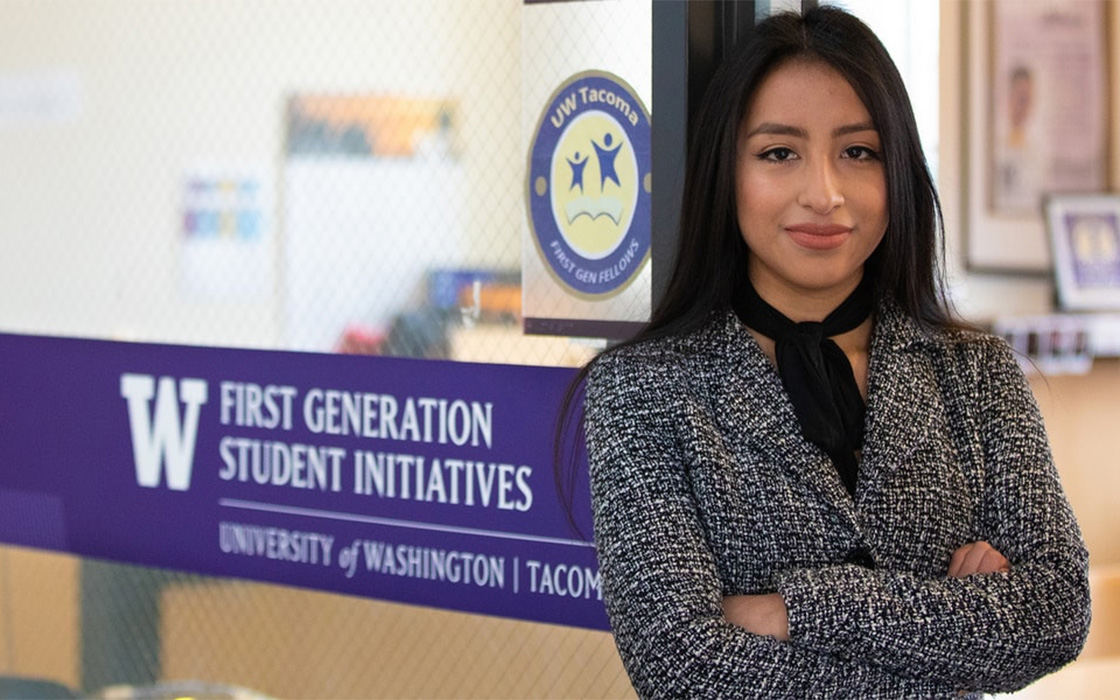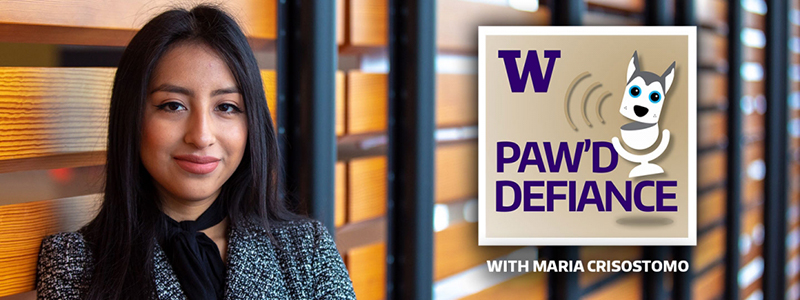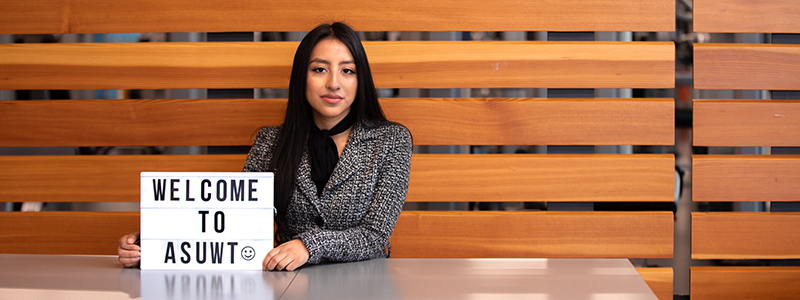
Maria Crisostomo: Being the First
First-generation student, Indigenous artist, podcast host, leader. Maria Crisostomo is busy making a difference.
Update since we published this story earlier in 2019: Maria Crisostomo, ’19, Politics, Philosophy & Economics, currently interns with the Tacoma Housing Authority. She completes her coursework this year and is planning to take a gap year before starting graduate school.
One wonders how Maria Crisostomo finds the time. The UW Tacoma senior seems to be everywhere. When she’s not working toward her degree in politics, philosophy and economics, she’s busy on campus whether that’s helping start a new initiative through student government or tackling the needs of first-generation students. Down time doesn’t seem to be part of Crisostomo’s vocabulary. Indeed, she views each moment as an opportunity to get involved.
Crisostomo is a part of the Indigenous P’urhepecha Community, native to Michoácan, Mexico. She was born in Quinceo, a part of Michoácan, where she lived until she was five years old. Her father did contract work in the United States and would travel back and forth between the two countries. He eventually settled in Washington where Crisistomo and her mother joined him. “I remember the bus ride leaving Mexico to come to the United States—it was a long trip,” said Crisostomo. “I had such a Hollywood image of what the United States was, and I remember thinking ‘this is nice, but not like in the movies.’”
The transition to life in the U.S. proved challenging. “First grade was my first year in American schools, and I hadn’t learned English quite yet,” said Crisostomo. “I couldn’t really ask questions, and for a while I couldn’t even ask to go to the restroom, I would hold it in.” Crisostomo did find her footing and did so without abandoning her heritage. “My mom wanted us to learn English, but she was also determined that we wouldn’t forget our Indigenous language or Spanish,” she said. “So, we would speak English at school, and P’urhepecha and Spanish at home.”

Crisostomo remains dedicated to her roots. “My mom and I cook a lot of P’urhepecha foods such as atápakua, churipo ka corundas, and putsuti kamata,” she said, “We also still wear our traditional clothes when we have family celebrations. In Mexico, we wear our traditional clothes daily but here only when we have celebrations.”
Crisostomo came to UW Tacoma in 2016. A first-generation college student, she found those early moments overwhelming. “Stepping foot on campus was so new and the environment was so different from high school and having to learn new terminology I wasn’t familiar with,” she said. Crisostomo persevered thanks in part to her own hard work and the support of her family and the UW Tacoma community. “I want to make my family proud and represent my Indigenous P’urhepecha community,” she said.
Success in higher education came, and when it did, Crisostomo decided she needed to pass on her knowledge to other first-generation students. “Once I became involved I started to learn more about the resources and got a campus job because I wanted to advocate for and represent students like myself,” she said, “For me, working on campus wasn’t just about an income or a title, but being the change through my work and serving a purpose for students on campus.”
That desire to “be the change” helped build the First Gen Fellows program. In the summer of 2017, Crisostomo started working in the office where the program was housed. Over time she slowly got more and more involved. Crisostomo teamed up with fellow student Diana Algomeda, who had been researching ways to help first-generation students on campus. “When we were doing research our primary questions were: ‘What are the needs of first-gen students? What are other universities doing that we aren’t?,” said Crisostomo. “About 65% of the UWT student population are first-gen students,” she said, “These students needed to be better represented, and I wanted to do what I could to help them be successful students in their transition to a University.”
Crisostomo and Algomeda organized events and even established a First-Gen Guiding Model that explained the transition of college students through three phases — navigation, empowerment and leadership. They also helped develop the We Are First Generation campaign. “I started to see growing support from the University and student body,” said Crisostomo.

-- Maria Crisostomo, '19
First Gen Fellows has grown since its inception. “We’ve started introducing new components to the organization to help with stress relief and being a happy student,” said Crisostomo. “Last spring we had a bunch of therapy puppies come on to campus for students to play with, it was a real success.” The group has organized other activities including bonfires, self-defense classes and workshops and now has a full-time staff member dedicated to it.
Crisostomo recently left First Gen Fellows to focus more on her studies but knows that her work with first-generation students isn’t over. “This program is important to me because it was a student-initiated project started by people who identify as first-gen to cater to students like them,” she said, “It took a lot of hard work and time, but it was so worth it knowing that new first-generation students will feel represented and have help adjusting to college life.”
She may no longer be an official part of First Gen Fellows, but that doesn’t mean Crisostomo isn’t busy. She is part of ASUWT as a senator representing the School of Interdisciplinary Arts & Sciences. “I love to hear what people have to say about campus and their needs as a student, many of whom are also balancing busy lives and jobs,” said Crisostomo. Her work as a senator serves a dual purpose. She gets to help people but she also gets to practice. Crisostomo plans to eventually work in government.
Crisostomo may keep a hectic schedule but she makes room for herself. “I always take advantage of any breaks I have to draw and paint,” she said. “I love to draw faces. While people, of course, have similarities, every face is so unique. There just isn’t another one quite like it.”
Crisostomo’s art is often inspired by her Indigenous heritage and is a way for her to relax when life gets stressful. “For me, art is a way to express my thoughts, anger, joy, and belief,” she said. “I like to connect it to native art to represent my P’urhepecha culture as an Indigenous woman,” she said.
Maybe one shouldn’t wonder how Crisostomo finds the time. Perhaps it’s better to see that she does and to marvel instead at what she’s achieved.



